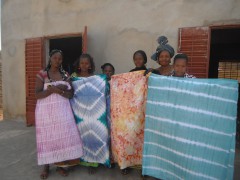New Horizons: Malian Women move beyond the Home
In the conservative Muslim culture of Mali, women fulfill their traditional gender roles of raising children, tending the home and working on the family farm.
However, increasing internal and external economic pressures are pushing them to find alternative means of income to supplement their household needs and even to reach out for political participation.
Malian women have at least three children and work from sunrise to sundown. Before dawn breaks women have swept their homes, ground millet to make Toh for breakfast, and bathed and fed their children before they go to school.
Despite such heavy daily responsibilities, women have become a dynamic entrepreneurial group contributing to local economies and even leading their communities in some cases. Polygamy is legal in Mali and frequently practised, and although the man’s responsibility is to provide for the household (its many wives and children), it is the women who increasingly have to finance clothing, shoes, school supplies, medicines and any other additional needs.
Through organizations and cooperatives, rural and urban women fit extra income-generating activities into their busy schedules, selling all kinds of goods and foodstuffs and working on communal gardens. Women find that organizing themselves in money-making schemes is empowering because it gives them the opportunity to exchange ideas, have fun and learn from one another.
These activities and the increasing economic responsibilities women face have nurtured an important conversation about women’s development. For this year’s International Women’s day, I reached out to the women I had come to know during my time with the Peace Corps. This year’s celebration addressed women’s equality in society and participation in decision-making. Throughout the country, women engaged in conversations about women’s lack of presence in local and national politics with regard to voting, holding positions in government and participating in political campaigns.
Women identified that education, particularly higher education, was the biggest stepping stone to achieving full participation in politics. They pointed out that their busy schedules and the weight of cultural expectations on them to fulfill their traditional roles often prevented them from finishing their basic education, and were an even higher barrier to pursuing higher education or a career in politics.
Despite these challenges, these hardworking women and excellent housewives have stepped into the public sphere and now empower other women to pursue their education.
Meet Laure, a sweet and compassionate sewing instructor. A teacher by trade, she is the primary instructor at a vocational sewing center for young women who have abandoned secondary school either for financial reasons or child-care constrictions. Always concerned with finding innovative ways to advance the technical level of her students, Laure assists them in developing a career in tailoring.
Meet Saran, an intelligent entrepreneur-philanthropist who values education and hard work. An accountant at the Mayor’s office, she also studies at night school to earn her certification in accountancy.
Saran owns her own restaurant and is president of a Shea cooperative of 3,000 rural women and a national Shea producer network. Her philanthropic work has made her famous. A few years ago she opened a literacy and sewing vocational center for young women.
She hosts 10 of her nieces at her home so they can attend better schools in the city. Saran’s passion is to see women develop and succeed, to give them the opportunity to contribute financially to their households and also develop a career.
Photo credits: Cynthia Macias
Tags: education, entrepreneurship, France, Islamism, Mali, Peace Corps, People, women, women in entrepreneurship, women's rights




